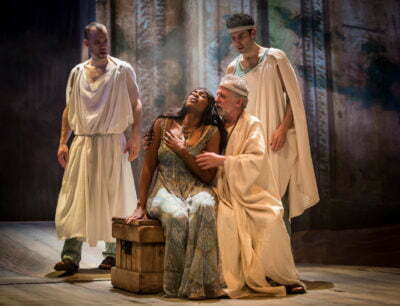Pericles

By William Shakespeare (and George Wilkins?)
Directed by David H. Bell
Produced by Chicago Shakespeare Theater on Navy Pier
If you, born in these latter times/ when wit’s more ripe, accept my rhymes/ and that to hear an old man sing/ may to your wishes pleasure bring/ I life you wish.
Pericles Takes Us on a Magical Journey
In an interview in the program note, director David Bell says he is interested in Pericles because it tells the story of a lifetime. The plot twists and winds across two generations and a wide variety of strange encounters in the ancient Middle East. But in the end, it focuses on reconciliation and peace after a period of trials. Bell’s production of this less-produced Shakespeare play is a masterpiece, featuring an energetic ensemble, a lush design, delightful music, and an exciting, though fanciful story.
Pericles, Prince of Tyre, is based on a section of the medieval poet John Gower’s Confessio Amantis, which in turn was based on a now lost Greek poem about Apollonius of Tyre. The story is entirely fictional; it has nothing to do with the Athenian statesman Pericles. That’s an important point, because the original was likely created long after ancient democracy gave way to despotism. The tumultuous post-Alexander the Great period, with all its royal incest, assassination plots, and debauched courts would naturally be fascinating to the Jacobeans, whose literature often had similar themes.
We begin with the young Pericles (Ben Carlson), approaching Antioch, intending to marry King Antiochus’s daughter. The depraved king (Sean Fortunato) demands anyone seeking her hand must answer his riddle, or lose his head. Too smart for his own good, Pericles solves the riddle: Antiochus has already married his own daughter. Lamenting that he sought to learn the tyrant’s secrets, Pericles flees for his life. But he knows he cannot remain in his own kingdom of Tyre without risking Antiochus will destroy the entire country, so he hands power over to his loyal friend Helicanus (Dion Johnstone) and sets off with a fleet for adventure.
And does he ever find it. First there is the land of Tarsus, where the people are starving until Pericles brings them grain. Then there is Pentapolis, where Pericles falls in love and marries the princess, Thaisa (Lisa Berry). She gives birth to a daughter, Marina during a terrible storm, and seems to die. Knowing the frail baby cannot travel, Pericles leaves her to the leaders of Tarsus, while he returns home heartbroken. Thaisa is found by a seer, Cerimon (Ross Lehman), who restores her to life, and she also believes her family dead. Marina (Cristina Panfilio) is brought up in Tarsus, but attracts the envy of the royal family there, who plot her murder. After a run in with pirates, Marina must endure her own odyssey to save her life and reunite the family she has never known.
Ben Carlson brings humanity and dignity to Pericles. While the character as written is undistinctive, Carlson transitions from a brash, ambitious young man, to a battered, frightened, but still resourceful outsider, to a responsible but haggard captain, to a broken creature in need of a miracle all in one show. Kevin Gudahl as King Simonides and Lisa Berry as Thaisa use their scenes to welcome Pericles into a loving family, allowing us to vicariously feel his relief and joy. Christina Paniflio’s gentleness and persuasive abilities as Marina are pushed to the limit by the script’s demand that she talk so many slavers out of raping her, but she is charming. Ross Lehman’s Cerimon is a quite humble and unprepossessing wizard, making him lovable instead of awe-inspiring. Sean Fortunato and Ora Jones play both friends and enemies to the heroes in different roles (Antiochus/Lysimachus and Lychordia/the Bawd), and are so convincing as each I forgot they were the same actors.
Bell’s choreography utilizes the ensemble’s range of musical, movement, and dramatic skills. In one scene, their drumming and parading of severed heads creates the ludicrously deranged court of Antioch. In another, their daring soldiers’ dance and partying establishes the warmth, communality, and exuberance of Pentapolis. Scott Davis’s scenic design somewhat resembles Petra, and is changed mostly through Aaron Rhyne’s projections, making each location fresh and grandiose. Nan Cibula-Jenkins has decked the cast mostly in lovely shades of teal, but brings out a gaudier palette for the brothel in Mytilene. Jesse Klug’s lighting and James Savage’s sound design work together to wash the stage in an atmosphere of wonder, and they are aided greatly by Henry Marsh’s original music. Two days later, his beautifully soothing songs are still stuck in my head, which rarely happens to me when I see musicals.
Rather than the contained story we are used to, this is the kind of play that, like in Sanskrit dramatic theory, samples from each one of our emotional tastes to create an elaborate meal. It is commonly believed the first half was written by a different playwright, perhaps accounting for the strangeness of starting off a story about redemption and hope with such viciously Jacobean situations. I doubt Marina could have talked her way out of Antioch or famine. And yet, Bell made the heightened cruelty of his world match the miraculous joy. Carlson waits until the final scene to plunge all-in to loud, overwhelming feelings, and when he does, they feel deserved. See this play, and you’ll remember why Shakespeare is so beloved, and still think years from now it was one of your best nights in the theatre.
Highly Recommended
Jacob Davis
Reviewed December 9, 2014
For more information, see Pericles’s page at Theatre in Chicago.
Playing at the Jentes Family Courtyard Theater at Chicago Shakespeare Theater, 800 East Grand Avenue, Chicago. Call 312-595-5600 or visit www.chicagoshakes.com. Plays through January 18, 2015; Tuesday-Friday at 7:30 pm except for December 16, when it’s at 1:00 pm, and December 17 and 23, when it’s both 1:00 pm and 7:30 pm, as well as 3:00 pm and 8:00 pm on Saturdays and 2:00 pm on Sundays, and 6:30 pm on December 28, January 4, and January 18. Tickets are $48-78, or $20 for people under 35 through CST program. Running time is two hours and thirty-five minutes with one intermission.




